Activities
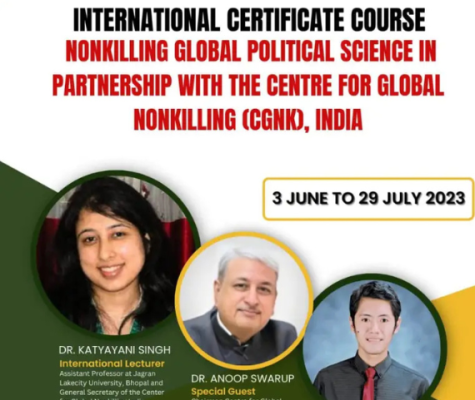
Launching of International Certificate Course on Global Nonkilling Political Science
The Center for Global Nonkilling had recently launched a certificate course on Nonkilling in collaboration with the PLmun, university in the Philippines. The course ran over 5 weeks from 3rd June, 2023 to 29th July, 2023. The programme was launched with the welcome address by Dr. Dan Jefferson, the Dean of Institute of Public Policy and Governance at Pamantasan ng Lungsod ng Muntinlupa. The welcome address was followed by a special message delivered by the President of the University of the ... City of Muntinlupa and then by Dr. Anoop Swarup, Chairman of the Advisory Council of CGNK, Hawaii and India. Further the course was introduced by Dr. Katyayani Singh, Secretary General of of CGNK, India. The vision of Nonkilling was further explained in the words of Dr. Glenn D. Paige by sharing his video. The course ran over 5 weeks describing the essence of Nonkilling Philosophy in the domain of Political Science and why it is an essential philosophy in the contemporary world. The course started with the introduction of Nonkilling Political Science philosophy in comparison with Political Science. It further covered the traditional philosophies of Political Science such as: Social Contract Theory; Utilitarian Theory; Marxist Theory which have played a dynamic role in society that further have escalated killings at times though originally they had propagated for protection of human rights and dignity. The course then highlighted the socio-political leaders who by using certain philosophies either promoted killing or nonkilling. Finally, the course ended with showing a conceptual analysis of nonkilling so that political scientist may make use of it to come out with relevant policies for their state.
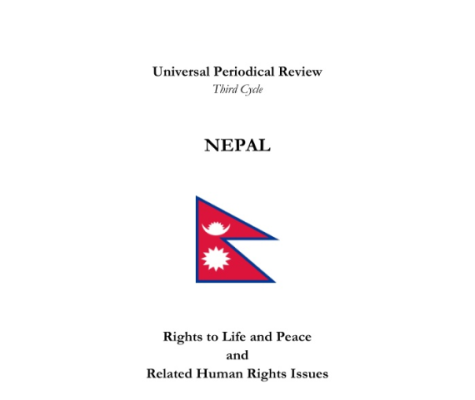
Universal Periodic Review of Human Rights in Nepal
Paper submission by CGNK UN Reprsentative, Christophe Barbey for Universal Periodic Review of Human Rights in Nepal. The paper covers the themes of enforced disappearances, suicide and peace policies (extensively); as also homicides and traffic casualties. This submission addresses critical human rights concerns in Nepal, focusing on enforced disappearances, suicide rates, peace policies, homicides, and traffic casualties. It highlights the urgent need for systematic reforms and the implementation of effective policies to safeguard human rights and promote public safety.
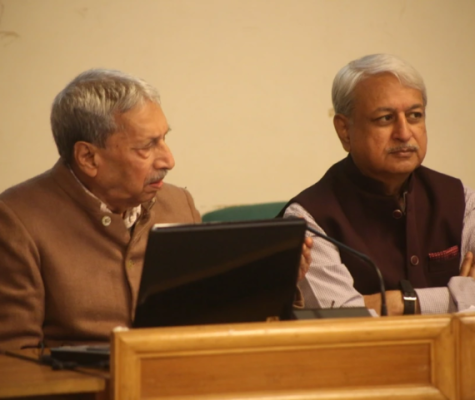
Launch of Nonkilling India and one crore Nonviolent families at a function organised by Gandhi Darshan at New Delhi on 18th Dec 2019.
On 18th December, 2019 a meeting of prominent Gandhians, academicians and young students with the purpose of launching the Center for Global Nonkilling movement (CGNK), India and 1 crore non violent families was held at Gandhi Darshan, New Delhi. The meeting witnessed the presence of eminent dignitaries. Prof. (Dr) Anoop Swarup, chairman of CGNK Hawaii and founding Vice Chancellor of Jagran Lakecity University explained the concept of nonkilling explicitly. He described the precepts and princ... iples of nonkilling and also introduced the Global Nonkilling Index which measures the types and rates of killing. He defines ‘affirmative nonkilling’ that is positive and structural such as promoting education, learning and advocacy against killing. He described about some of the academic contributions done by the Center for Global Nonkilling, Hawaii where works on Nonkilling have been promoted in the discipline of music, arts, engineering, mathematics, anthropology, psychology, linguistics, geography, media studies and political science. But now he states that after setting up the theoretical background time has come to implement it practically. This can be done possibly by training people in the art of nonviolence. Dr. N. Radhakrishnan, founder of Indian Council and Gandhian studies spoke at length about the important issues concerning India. He elaborated that how despite 2019 being the 150th birth anniversary of Gandhi little was done by India as a nation to rediscover Gandhi. Further he highlighted that in the year 1969; the year that marked the 100th anniversary of Gandhi there was great upheaval in the nation. The government of India had invited Khan Abdul Ghaffar Khan, popularly known as Frontier Gandhi to pay homage. The nation was up in arms due to the Hindu Muslim tension. As a consequence, Khan Abdul Ghaffar Khan refused to pay tribute by flowers rather he offered his tears. He remarked to the people of India: “You have betrayed Gandhi“., His analysis perhaps wasn’t wrong perhaps for at present Dr. Radhakrishnan states that the atmosphere of dialogue and reconciliation is missing. Gandhi had suggested the formulation of Shaanti Sena and acting upon this principle Dr. Radhakrishnan did formulate such Shaanti Sena. However, amongst the 68 registered Senas in the nation, Shaanti Sena isn’t recognized legally and is popularly lesser known. On August 23, 2018, a meeting was held in which 300 members had participated. It was a consultative meeting and herein it was suggested to take nonviolence to families. The meeting talked about family based nonviolent movements and the need to discover the marvel of nonviolence and nonkilling in simple living. It was also suggested by Dr. Radhakrishnan to hold book discussion of books related to nonkilling at universities so as to create awareness amongst the youth especially.
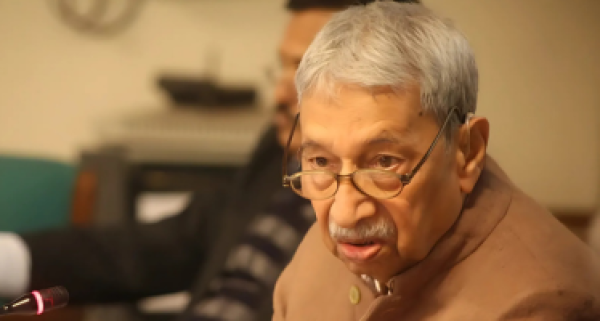
Dr Y.P. Ananda, former director of National Museum
Dr Y.P. Ananda, former director of National Museum and Chairman Railway Board, the special guest, also a Gandhian invited for the meeting spoke on Ahimsa. He emphasized upon the direct and structural form of violence and had posed a question whether nonkilling extends to structural violence also. He stated that inequity and social disturbance are the core cause that need to be addressed. According to him education and health are the issues that need primary focus.
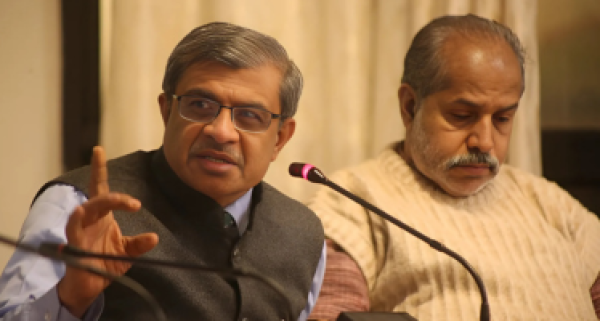
Dr. C.A. Gurudath, former Vice Chancellor
Dr. C.A. Gurudath, former Vice Chancellor, Rafal University, gave recommendation of translating the book ‘Give Nonkilling A Chance’ into different languages so as to popularize it. He also expressed his concern over changing the current educational system as it breeds competition which is not healthy for the society.
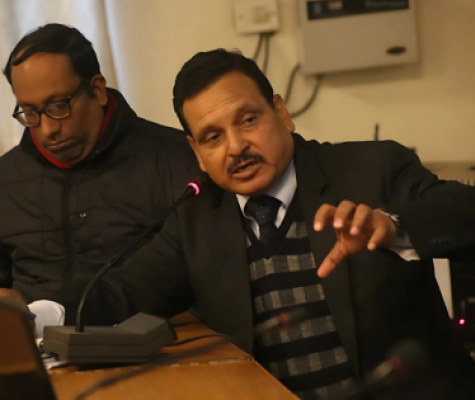
Prof. Ramesh Kumar, Professor at Delhi University
Prof. Ramesh Kumar, Professor at Delhi University spoke about the launch of the Shaanti Sena programme that was extremely successful. He recommended to co-ordinate with the UGC to launch Nonkilling program at different universities. He emphasized on the need to have a structured organization to reach everywhere.
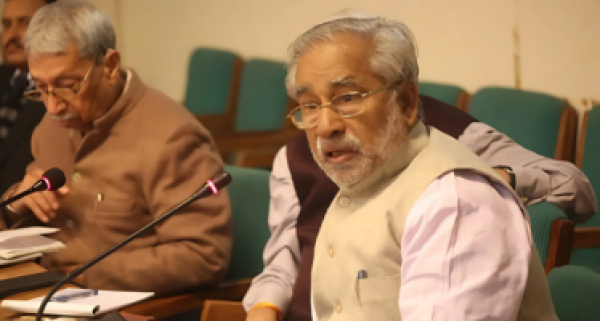
There was a suggestion as to how Gandhi’s vision
There was a suggestion as to how Gandhi’s vision can be preserved at university such as initiating Charkha program in the university itself. A lot of stress was made on the importance of moral education in schools. Some points were raised regarding involving young students in the program. It was also suggested to involve religious organizations such as ISHA foundation for the purpose of mass appeal There were also suggestions regarding the formulation of dramatic society to spread th... e idea of nonkilling. The idea to train to fight violation of human dignity without being violent and to check misinformation being spread over social media was also given. Gandhi’s idea was that of decentralization so it was suggested to take measures so as to promote decentralization. Formulation of state level policy in relation to nonkilling was recommended As a conclusion of this brainstorming session it was observed that moral education, good education, nonviolent and nonkilling education for affirmative nonkilling and positive peace is the way forward to build such institutions and systems so as to inculcate the values of morality, spirituality, consciousness, innovation and creativity in our youth. This idea needs to be delivered and Gandhian ethics can help in the formulation of moral education. Such a paradigm shift will not only lead to better citizenship, law and order, social harmony and progress but also to a new civilizational ethos of peace and enlightenment.
